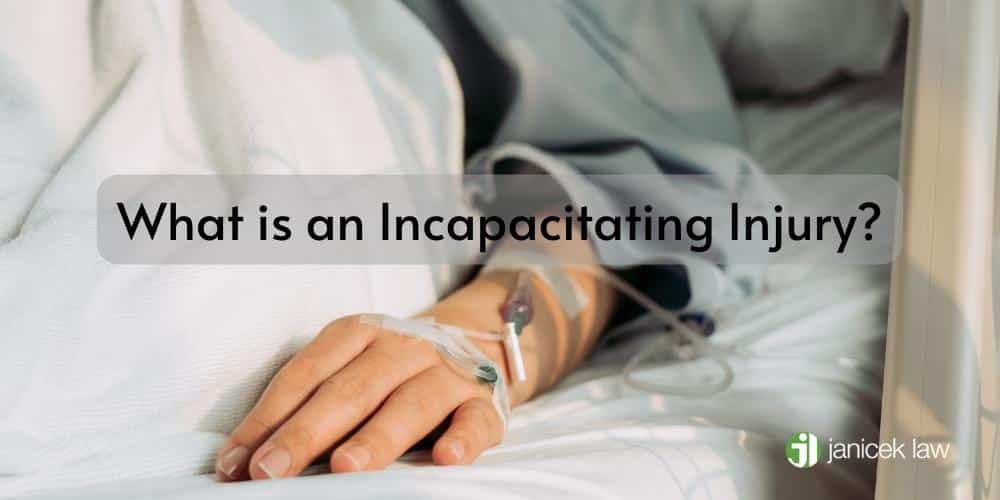The most general definition of an incapacitating injury is: a non-fatal injury which is evident to observers at the scene of a crash. Additionally, many people define this type of catastrophic injury as a non-fatal injury which prevents victims from functioning normally. A serious injury that falls into this definition could be severe cuts, head injuries, back injuries, etc. It often takes victims weeks or months to recover from an incapacitating injury. And even when they do recover, many are partially or permanently disabled. Many victims of incapacitating injuries suffer physically, emotionally, and financially for years to come. Luckily, these victims can pursue justice and financial compensation through a personal injury lawsuit.
If you or someone you love has suffered an incapacitating injury due to someone else’s negligence, you may have grounds to file a lawsuit. A San Antonio catastrophic injury lawyer at Janicek Law will listen to your story, help you determine if you have a strong case, and fight for your justice. Call us today at 210-366-4949 to schedule a free consultation.
What is an Incapacitating Injury?
Incapacitating injuries are basically catastrophic injuries. According to the KABCO injury scale, Texas defines an incapacitating injury as a “severe injury which prevents continuation of normal activities; includes broken or distorted limbs, internal injuries, crushed chest, etc.”
Meanwhile, most U.S. states describe an incapacitating injury in a similar way: a non-fatal injury which prevents the injured person from walking, driving, or normally functioning following their accident. Additionally, a suspected serious injury – such as an incapacitating injury – often includes momentary unconsciousness at the scene of the crash or accident.
An incapacitating injury sustained at an accident or crash scene generally requires emergency medical treatment in order to save the person’s life.
Examples of Incapacitating Injuries
Examples of severe injuries that fall under this definition include:
- Abdominal injuries
- Severe lacerations
- Chest injuries
- Head injuries, such as a traumatic brain injury or a subdural hematoma
- Spinal cord injuries
- Neck injuries
- Partial or complete paralysis
- Broken bones
- One or more amputations
- Chronic pain
- Nerve damage
- Severe road rash
- Any type of injury that prevents someone from accomplishing the same day-to-day tasks they were capable of performing before the injury
In most cases, incapacitating injury victims suffer from lifelong disability and pain. Depending on original injury severity, this means that the injured person likely can’t work, take care of themselves, or take care of their families. As a result, the injured person and their family may suffer great physical, emotional, and financial distress.
People who suffer an incapacitating injury due to someone else’s negligence may have grounds to file a catastrophic injury lawsuit in order to recover financial compensation. With the right team of San Antonio personal injury lawyers, victims can receive damages for their pain, suffering, medical bills, caregiving bills, physical therapy bills, and so much more.
What is a Non-Incapacitating Injury?
According to the same KABCO injury scale, Texas defines a non-incapacitating injury as an “evident injury such as bruises, abrasions, or minor lacerations which do not incapacitate.” Basically, an incapacitating injury is one that causes significant bodily harm, but not enough to completely disable the person after their recovery.
Examples of Non-Incapacitating Injuries
Examples of non-incapacitating injuries include:
- Bruises
- Minor lacerations
- A minor head injury such as a lump on the head or a concussion
- A minor neck injury such as whiplash
- Abrasions
- Muscle sprains and strains
- A joint dislocation
- Minimal scarring
- Any minor injury to the body that results in little to no impairment
A minorly injured person may still require medical treatment such as a general physical exam, stitches, pain medication, slings, etc. However, there is no serious injury that prevents the injured person from walking, driving, or normally functioning. Therefore, the minor injury sustained would not warrant emergent medical care.
A non-incapacitating injury sustained during a motor vehicle crash, for example, may warrant a personal injury lawsuit against the negligent party. While minor injuries like the ones listed above don’t usually result in permanent disability – and therefore, mountains of medical bills – victims may still have to go in and out of the doctor’s office and miss work for several weeks. Because medical care is expensive for almost everyone, this can cause a temporary financial strain. Victims whose non-incapacitating injuries were caused by a negligent party could potentially recover financial compensation through a personal injury lawsuit.
What is a Possible Injury?
A possible injury is another category of injury reported on the KABCO injury scale. Texas defines possible injuries as an “injury which is claimed, reported, or indicated by behavior, but without visible wounds; includes limping or complaint of pain.” Many other states define this as a suspected serious injury at the scene of the crash.
Examples of Possible Injuries
Examples of possible injuries could include:
- Broken bones
- Joint dislocation
- Internal injuries, such as organ damage
- Minor head injuries such as a concussion
- Minor neck injuries such as whiplash
- Momentary unconsciousness
Possible injuries could turn into incapacitating injuries depending on the circumstances surrounding the accident. That’s because many people experience a major rush of adrenaline during a motor vehicle traffic crash which prevents them from experiencing the full extent of their injuries until they calm down.
The fight or flight response is powerful; it allows people to fight for their lives and survive despite their underlying injuries. Observers at the scene of a crash may initially label someone as having a “possible injury” because despite a minor limp or complaint of pain, they’re functioning normally. As the stress of the day wears off, the person may later experience chronic pain and even severe organ damage as a result of their accident.
If a person received a possible injury from a motor vehicle crash that later turned into an incapacitating injury, they may also have grounds to file a catastrophic injury claim against the at-fault party. The San Antonio personal injury attorneys at Janicek Law will listen to your story and help you determine the best course of action.
What is a Fatal Injury?
While the answer to this question seems obvious, Texas includes a specific definition on the KABCO injury scale. Fatal injuries are injuries so severe that people die from them. Similarly, a fatal crash is one in which at least one person suffers death within 30 days of a crash.
Family members of loved ones who suffered fatal injuries may have grounds to file a wrongful death lawsuit against the at-fault party. Our experienced wrongful death attorneys in San Antonio have what it takes to fight for justice in both wrongful death and personal injury claims.

Common Causes of Incapacitating Injuries
The most common cause of incapacitating injuries are motor vehicle crashes such as car accidents, 18 wheeler accidents, motorcycle accidents, pedestrian accidents, accidents caused by texting or driving under the influence, etc. However, people can suffer incapacitating injuries from a wide variety of accidents. If your incapacitating injury occurred during one of the following incidents, you may have grounds to file a catastrophic injury claim.
- Medical malpractice
- Nursing home falls
- Construction accidents
- Premises liability incidents such as a slip and fall accident
- Home or apartment fires
- Incidents involving defective products
Texas Modified Comparative Fault Rule
It’s important to remember – whether you’re involved in a non-injury crash or an injury crash – that Texas is an at-fault state. This means that whoever is responsible for a motor vehicle crash must compensate all other drivers for their damages. At fault drivers may do this through their insurance company or through their own bank account.
An insurance claim rarely gives victims enough money to cover their property damage and their medical bills though, especially if one or more victims have suffered incapacitating injuries. When this happens, victims often resort to filing some kind of personal injury claim.
It’s also important to remember that Texas follows the 51% comparative fault rule when it comes to compensation for major accidents. This means that if a driver shares more than 51% of the blame in an accident, then they can’t receive financial compensation for their damages. So if you suffered incapacitating injuries from a collision that you more than 51% at fault for, you will likely have a weak personal injury case against the other driver.
Damages for an Incapacitating Injury
As previously stated, if an insurance claim doesn’t provide enough compensation to cover your medical bills and property damage, you could file a personal injury claim against the at fault driver. The amount of compensation you could recover through a personal injury claim depends on a variety of factors such as injury severity, recovery time, whether or not you’re permanently disabled, how much work you’ve missed due to your injuries, etc. San Antonio personal injury attorneys at Janicek Law can help you build the strongest case possible to recover damages such as:
- Past and future medical bills
- Past and future physical therapy bills
- Caregiving bills, if the victim is partially or permanently disabled following the motor vehicle crash
- Physical pain and suffering
- Emotional distress
- Lost wages
- Loss of earning capacity
- Loss of consortium
- Scarring and disfigurement
- Funeral and burial expenses if the motor vehicle crash resulted in fatal injuries

Call San Antonio Personal Injury Attorneys at Janicek Law Today
If you have suffered incapacitating injuries from a motor vehicle traffic crash involving a negligent driver, you may have grounds to file a personal injury claim. Additionally, if you or a loved one suffered incapacitating injuries from nursing home abuse and neglect, premises liability violations, defective products, construction accidents, and more, Janicek Law can fight for you too. Our experienced and compassionate legal team has what it takes to fight for your justice and also handle insurance company negotiations. That way, you can focus on recovery alone. Call a San Antonio personal injury attorney at 210-366-4949 to schedule a free consultation.

